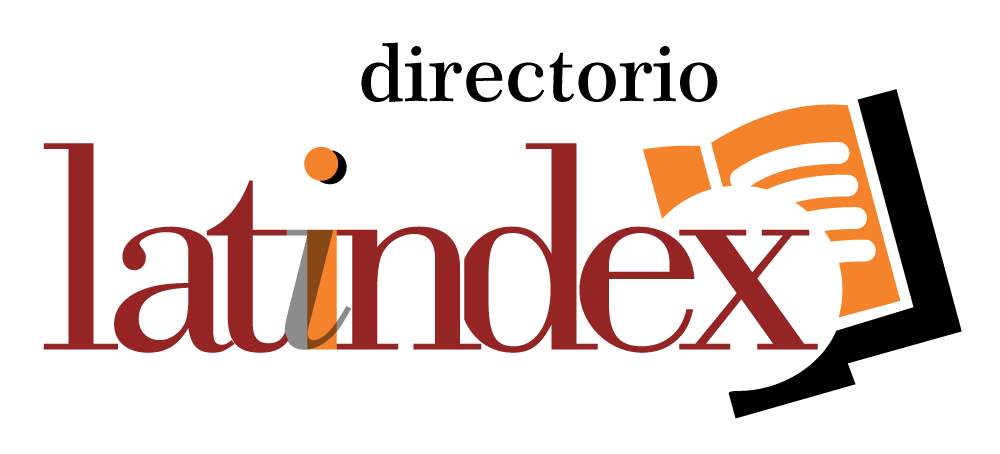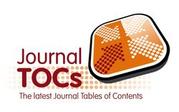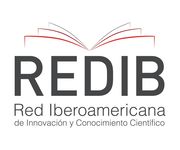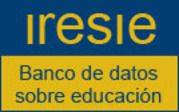DOI:
https://doi.org/10.14483/23464712.14656Published:
2020-05-01Biological evolution and creationism from the perspective of graduate students of biological sciences
Evolución biológica y creacionismo en la visión de los estudiantes de ciencias biológicas
Evolução biológica e criacionismo na visão de alunos de ciencias biológicas
Keywords:
evolution, creationism, teachers in education (en).Keywords:
evolución, creación, profesor en formación (es).Keywords:
evolução, criação, eestudantes para professor (pt).Downloads
References
ABREU, H. O Ensino da Evolução no Presente Uma Análise Crítica. Colóquio do Centro de Filosofia das Ciências da Universidade de Lisboa. Faculdade de Ciências da Universidade de Lisboa. Lisboa. 2007. Disponível em <http://cfcul.fc.ul.pt/coloquios/coloquio_criacionismo/coloquio_criacionismo.htm>. Acess: June 20, 2019
ALEXAKOS, K.; PIERWOLA, A. Learning at the ''boundaries'': radical listening, creationism, and learning from the ''other''. Cult. Stud. of Sci. Educ., Heidelberg, v. 8, pp. 39-49. 2013. https://doi.org/10.1007/s11422-012-9470-7
ALMEIDA, D. F. de. Concepções de alunos do ensino médio sobre a origem das espécies. Ciência & Educação, Bauru, v. 18, n. 1, pp. 143-154. 2012. https://doi.org/10.1590/S1516-73132012000100009
AMARAL, J. A. Fatores que dificultam ou facilitam o ensino-aprendizagem de Evolução Biológica na visão de professores de Biologia em Mossoró/RN. In: IX CONGRESSO DE INICIAÇÃO CIENTÍFICA DO IFRN. Anais do… Rio Grande do Norte. pp. 1826 2013.
ÁVILA, G. C. The edge of evolution: the search for the limits of darwinism. Revista Brasileira de História, São Paulo, v. 28, n. 56, pp. 593-596. 2008. https://doi.org/10.1590/S0102-01882008000200019
AYALA, F. J. Darwin's gift to science and religion. National Academies Press. Washington D. C., United States. 2007.
AYALA, F. J. Scientific literacy and the teaching of evolution. Ludus Vitalis, Mexico D. F., v. 21, n. 39, pp. 231-237. 2016.
AYALA, F. J. A Origem da Humanidade e o seu futuro biológico. Printer Portuguesa. Rio de Mouro: Portugal. 2017.
BARBOUR, I. G. Religion in an Age of Science. Harper San Francisco. San Francisco: United States. 1990.
BARBOUR, I. G. Quando a ciência encontra a religião. Editora Cultrix. São Paulo: Brasil. 2004.
BEHE, M. J. A caixa preta de Darwin: o desafio da bioquímica à teoria da evolução. Jorge Zahar. Rio de Janeiro: Brasil. 1997.
BISHOP, B. A.; ANDERSON, C. W. (1990). Student Conceptions of Natural Selection and Its Role in Evolution. Journal of Research in Science Teaching, Champaign, n. 27, pp. 415-427. https://doi.org/10.1002/tea.3660270503
BIZOTTO, F. M; GHILARDI-LOPES, N. P.; SANTO, M. N. A vida desconhecida das plantas: concepções de alunos do ensino superior sobre evolução e diversidade das plantas. Revista Electrónica de Enseñanza de las Ciências, Porto, v. 15, n. 3, pp. 394-411. 2016.
CARNEIRO, A. P. N.; ROSA, V. L. Três aspectos da evolução: concepções sobre Evolução Biológica em textos produzidos por professores a partir de um artigo de Stephen Jay Gould. In: ENCONTRO NACIONAL DE PESQUISA EM EDUCAÇÃO EM CIÊNCIAS. Atas…, USP. São Paulo: Brasil. 2003.
CARROL, S. B. Infinitas formas de grande beleza: como a evolução forjou a grande quantidade de criaturas que habitam o nosso planeta. Tradução de D. ALFARO. Jorge Zahar Ed. Rio de Janeiro: Brasil. 2006.
CARVALHO, G. S.; CLÉMENT, P. Projecto 'Educação em Biologia, Educação para a Saúde e Educação Ambiental para uma melhor cidadania': análise de manuais escolares e concepções de professores de 19 países (europeus, africanos e do próximo oriente). Revista Brasileira de Pesquisa em Educação em Ciências, Belo Horizonte, v. 7, n. 2, pp. 1-21. 2007.
COIMBRA, R. L.; SILVA, J. Ensino de evolução biológica e a necessidade de formação continuada. In: ENCONTRO NACIONAL DE PESQUISA EM EDUCAÇÃO EM CIÊNCIAS. pp. 1-12 Florianópolis. Anais… ABRAPEC. Florianópolis, Brasil. 2007.
COSTA, H. A.; ANTUNES, F. Criacionismo e evolução: conflito cognitivo ou superação em biólogos com formação religiosa protestante? In: ENCONTRO DE ENSINO, PESQUISA E EXTENSÃO. pp. 1-20 Mato Grosso do Sul. Anais… ENEPEX. Mato Grosso do Sul. 2014.
COSTA, L. O.; MELO, P. L. C.; TEXEIRA, F. M. Reflexões acerca das diferentes visões de alunos no ensino médio sobre a origem da diversidade biológica. Revista Ciência e Educação, Bauru, v. 17, n. 1, pp. 115-128, 2011. https://doi.org/10.1590/S1516-73132011000100008
DAWKINS, R. O Relojoeiro Cego: A Teoria da Evolução, o Desígnio Divino. Companhia das Letras. São Paulo: Brasil. 2001.
DAWKINS, R. Deus, um delírio. Companhia das Letras. São Paulo: Brasil. 2007.
DEMBSKI, W. A. Intelligent Design: the bridge between science & theology. Downers Grove: IVP Academic. Illinois: United States. 1999. Disponível em: <https://books.google.com.br/books?id=Sd8I7U3ryKAC&printsec=frontcover&hl=pt-BR&source=gbs_ge_summary_r&cad=0#v=onepage&q&f=false>. Acesso: 13 de agosto de 2015.
DOBZHANSKY, T. Genetic diversity and human equality. Basic Books. New York: United States. 1973.
ENGLER, S. Tipos de Criacionismos Cristãos. Revista de Estudos da Religião, São Paulo, v. 2, n. 7, pp. 83-107. 2007.
FUTUYMA, D. J. Evolução, ciência e sociedade. Sociedade Brasileira de Genética. São Paulo: Brasil, 2002.
GUERRIERO, S. A fé na ciência: o ensino da evolução e sua congruência aos sistemas de crenças. In: XXII Reunião Brasileira de Antropologia. Fórum de Pesquisa Venturas e Aventuras Religiosas. Brasília, DF, v. 15, 15-19 de julho, 2000.
GOULD, S. J. Pilares do Tempo. Ciência e religião na plenitude da vida. Rocco. Rio de Janeiro: Brasil. 2002.
LICATTI, F. (2005). O Ensino de Evolução Biológica no Ensino Médio: investigando concepções dos professores de Biologia. Bauru: UNESP. 240 f. Dissertação Mestrado em Educação para Ciência, Faculdade de Ciências, Universidade Estadual Paulista-UNESP. São Paulo. 2005.
LIPORINI, T. Q.; PERIOTTO, F. A Evolução Biológica na Ótica de Alunos do Ensino Médio. In: V Jornada das Licenciaturas da USP/IX Semana da Licenciatura em Ciências Exatas-SeLic. São Carlos. 2014.
MADEIRA, A. Fé e evolução: a influência de crenças religiosas sobre a criação do homem na aprendizagem da teoria da evolução com alunos do 3º ano do ensino médio. 186p. Doutorado em Educação en PUC/SP. 2007.
MEYER, D.; EL-HANI, C. N. Evolução: o sentido da biologia. Unesp. São Paulo: Brasil. 2005. https://doi.org/10.7476/9788539302758
NORD, W. A. Science, religion and education. Religion & Education, Carolina do Norte, v. 26, n. 2, pp. 55-66. 1999. https://doi.org/10.1080/15507394.1999.11000904
OLEQUES, L. C.; BARTHOLOMEI-SANTOS, M. L.; BOER, N. Evolução biológica: percepção dos profesores de biología. Revista Electrónica de Enseñanza de las Ciências, Porto, v. 10, n. 2, pp. 243-263. 2011.
PADIAN, K; MATZKE, N. Darwin, Dover, 'Intelligent Design' and textbooks. Biochemical Journal, London v. 209, n. 417, pp. 29-42. 2009. https://doi.org/10.1042/bj20081534
PACHECO, R. B. C.; OLIVEIRA, D. L. O homem evoluiu do macaco? Equívocos e distorções nos livros didáticos de Biologia. In: VI ENCONTRO DE PERSPECTIVAS DO ENSINO DE BIOLOGIA. 87p. São Paulo. Anais… FEUSP. São Paulo: Brasil. 1997.
PENNOCK, R. T. Creationism and intelligent design. Annual Review of Genomics and Human Genetics, Salt Lake City, v. 4, n. 1, pp. 143-163. 2003. https://doi.org/10.1146/annurev.genom.4.070802.110400
PEREIRA, H. M. R. Um olhar sobre a dinâmica discursiva em sala de aula de biologia do ensino médio no contexto do ensino da evolução biológica. 167f. Dissertação (Mestrado)-Pós-Graduação em Ensino, Filosofia e História das Ciências, Universidade Federal da Bahia/Universidade Estadual de Feira de Santana, Salvador. 2009.
PIOLLI, A.; DIAS, S. Escolas não dão destaque à Evolução biológica. 2004. Disponível em: <http://www.comciencia.br/200407/reportagens/05.shtml>. Acesso em 19/09/2016.
PORTO, P. R. DE A.; FALCÃO, E. B. M. Teorias da origem e evolução da vida: dilemas e desafios no ensino médio. Ensaio Pesquisa em Educação em Ciências, Belo Horizonte, v. 12, n. 3, pp. 13-30. 2010. https://doi.org/10.1590/1983-21172010120302
RIDLEY, M. Evolution. Blackwell. Malden, Massachusetts: United States. 2004.
RODRIGUES, L. A.; CHAVES, S. N. Entre Dogmas: Criação e Evolução Fabricando Docência em Biologia. In: ATAS DO IX ENCONTRO NACIONAL DE PESQUISA EM EDUCAÇÃO EM CIÊNCIAS-IX ENPEC. pp. 1-8 Águas de Lindóia, SP. 2013
RODRIGUES, W. G.; CLEMENTINO, P. P. O ensino da teoria evolucionista na perspectiva dos professores de ciências da rede adventista de ensino. Revista Formadores, Cachoeira, v. 7, n. 3, pp. 5-27, 2014.
RODRIGUES, W. G.; MOTTA, R. S. S. Relações entre ciência e religião na perspectiva dos professores da Faculdade Adventista de Fisioterapia (FAFIS). Práxis Teológica, Cachoeira, v. 11, n. 1, pp. 105-129 2011
SANCHES, M. A.; DANILAS, S. Busca de harmonia entre religião e ciência no Brasil: Reflexões a partir do ano de Darwin. Teocomunicação, Porto Alegre, v. 42, n. 1, pp. 98-118 2012.
SANTOS, S.; BIZZO, N. O ensino e a aprendizagem de Evolução Biológica no cotidiano da sala de aula. In: VII ENCONTRO PERSPECTIVAS DO ENSINO DE BIOLOGIA. Anais do VII Enc. Perspectivas do Ensino de biologia. Faculdade de Educação da Universidade de São Paulo. São Paulo: Brasil. 2000.
SANCHES, M. A. O diálogo entre teologia e ciências naturais. O Mundo da Saúde, São Paulo, v. 31, n. 2, pp. 179-186 2007. https://doi.org/10.15343/0104-7809.200731.2.5
SEPULVEDA, C.; EL-HANI, C.N. Quando visões de mundo se encontram: religião e ciência na trajetória de formação de alunos protestantes de uma licenciatura em Ciências Biológicas. Investigações em Ensino de Ciências, Porto Alegre, v. 9, n. 2, pp. 137-175. 2004.
SHANKS, N. God, the devil, and Darwin: A critique of intelligent design theory. Oxford University Press. Oxônia: Reino Unido. 2004. https://doi.org/10.1093/0195161998.003.0003
SILVA, H. M. Interview with Francisco J. Ayala. Conexão Ciência (Online), Formiga, v. 11, n. 1, pp. 5-8. 2016. https://doi.org/10.24862/cco.v11i1.448
SILVA, H. M. Intelligent design endangers education. Science, New York, v. 357, n. 6354, pp. 880-880. 2017. https://doi.org/10.1126/science.aao3245
SILVA, H. M.; ARAÚJO, E. S. N. N. DE.; GIBRAM, D. E.; CARVALHO, G. S. Conceptual change about evolution and origins of life throughout an undergraduate course of Biological Sciences. In: Proceedings of INTCESS 14-International Conference on Education and Social Science Proceedings. pp. 1249-1258. Istanbul: Turkey. 2014.
SILVA, H. M.; MORTIMER, E. 'Rescuing Darwin' in Brazil 1. In: SILVA, I. (Ed.). Latin American Perspectives on Science and Religion. Pickering & Chatto. Oxford. The United Kingdom. 2014. pp. 97-108. https://doi.org/10.4324/9781315653990-9
SOUZA, S. de. A goleada de Darwin- sobre o debate criacionista/darwinismo. Editora Record. Rio de Janeiro: Brazil. 2009.
SOUZA, R. F.; MATSUO, T.; ZAIA, D. A. M. Evolucionismo X Criacionismo. Revista Ciência Hoje, v. 43, n. 256, pp. 36-45, janeiro/fevereiro. 2009.
STAUB, T.; STRIEDER, D. M.; MEGLHIORATTI, F. A. Análise da Controvérsia entre Evolução Biológica e Crenças Pessoais em Docentes de um Curso de Ciências Biológicas. Revista Electrónica de Investigación en Educación en Ciencias, Buenos Aires v. 10, n. 2, pp. 20-36 2015.
VALENÇA, C. R.; FALCÃO, E. B. M. Teoria da evolução: Representação de professores-pesquisadores de biologia e suas relações com o Ensino Médio. Revista Electrónica de Enseñanza de las Ciências, Porto, v. 11, n. 2, pp. 471-486. 2012.
How to Cite
APA
ACM
ACS
ABNT
Chicago
Harvard
IEEE
MLA
Turabian
Vancouver
Download Citation
BIOLOGICAL EVOLUTION AND CREATIONISM FROM THE PERSPECTIVE OF GRADUATE STUDENTS OF BIOLOGICAL SCIENCES
EVOLUCIÓNBIOLÓGICAYCREACIONISMO EN LA VISIÓN DE LOS ESTUDIANTES DE CIENCIASBIOLÓGICAS
EVOLUÇÃOBIOLÓGICAECRIACIONISMO NA VISÃO DE ALUNOS DE CIÊNCIASBIOLÓGICAS
Isabela Maria Silva Leão*, Fernanda de Jesus Costa**, Graça Simões Carvalho*** y Heslley Machado Silva****
Citation: Silva Leão, I.M., Costa, F.J., Simões Carvalho, G. y Machado Silva, H. (2020). Biological evolution and creationism from the perspective of graduate students of biological sciences. Gdola, ensenza y aprendizaje de las ciencias, 15(2), 303-321. DOI: http://doi.org/10.14483/23464712.14656
Recieved: 27 de march de 2019; accepted: 28 de june de 2019
* Graduate in biology and science from the University Center of Formiga/MG. Studying pedagogy at UNIFRAN. Participated in the Biology Teachers’ Conceptions of Three Latin American Countries about Human’s Place in Nature and the Human Mind, University Center of Formiga/MG, University of Oxford, supported by the John Templeton Foundation. Email: isabela.leao94@hotmail.com
** Professor at the Minas Gerais State University, Ibirité Unit. Currenlty head of the Department of Biological Sciences and supervisor of the Internship Center. Has a bachelor’s degree in biological sciences, a master’s degree in science teaching and a doctorate in education from the Pontifical Catholic University of Minas Gerais. Develops research on distance education, science and biology teaching, teacher training and integration of digital technologies into the school environment. Email: fernanda.costa@uemg.br
*** Full professor at the University of Minho, Braga, Portugal and director of the Research Centre on Child Studies (CIEC) at the same university. Developed postgraduate research training with a particular focus on school settings. In addition to 24 national projects, she was the general coordinator of pan-European project on 'Biology, Health and Environmental Education for better Citizenship' (BIOHEAD-CITIZEN: STREPFP6 CIT2-CT2004-506015; 2004–2008), which involved 19 countries in Europe, North Africa and the Middle East. Was awarded the honorary degree of doctor honoris causa by the University of Claude Bernard Lyon 1, France, in 2017, and received the Women in Science award from the Portuguese Ministry of Science, Technology and Higher Education in 2019. Email: graca@ie.uminho.pt
**** Doctorate in education from the Federal University of Minas Gerais (2015), Brazil, in the Latin American program, with specialization in education and science. Research undertaken focuses on issues of the teaching of evolutionary biology in Latin American Schools, in relation to regional religious and political discourse. Master’s degree in education from the Federal University of Minas Gerais (2000). Graduated in biology and science. Specialization in biotechnology from the Federal University of Lavras/MG and specialization in Molecular and Cellular Biology from the Federal University of Ouro Preto/MG. Currently full professor and project coordinator for the pedagogical residency program of in the University Center of Formiga/MG. Has experience in general biology, with emphasis on embryology, genetics, evolution, zoology and coordination of courses in the biological sciences. Email: heslley@uniformg.edu.br
Abstract
This work aimed to analyse students’ conceptions in a graduate course of biology teachers at the University Centre of Formiga, Minas Gerais, Brazil, of topics related to evolutionary theory (Chance and Natural selection) and creationism (God and Intelligent design). We used a part of the European BIOHEAD-CITIZEN questionnaire in a sample of 56 students, studying in their 2nd, 4th and 6th terms. The four-category Barbour model (conflict, independence, dialogue and integration) was used to analyse the data and characterise the students’ ideas of the relationship between science and religion. Using the Pearson chi-square statistical test (.2), the differences among the groups of students were tested, at the statistical significance level of 5%. The results show that most students are able to establish a relationship of independence between issues of evolutionary theory and creationism. Even religious students can establish boundaries that separate the fields of science and religion. Due to the importance of evolutionary theory for science and for biology in particular, it is necessary for new research to be carried out in the Brazilian context to determine students’ and teachers’ perceptions on the topic and to improve the teaching of evolutionary theory in the biological context and to refrain from inserting personal religious considerations into general science and biology classes.
Keywords: evolution; creationism; teachers in education.
Resumen
En el presente trabajo se analizan las concepciones de los estudiantes del curso de Ciencias Biológicas en el Centro Universitario de Formiga, Minas Gerais, Brasil, sobre temas relacionados con la teoría evolutiva (azar y selección natural) y creacionismo (Dios y diseño inteligente). Se aplicó el cuestionario europeo BIOHEAD-CITIZEN en una muestra de 56 estudiantes del 2°, 4° y 6° semestre. Se utilizó el modelo de Barbour de cuatro categorías (conflicto, independencia, diálogo e integración) para analizar los datos a fin de caracterizar las concepciones de los estudiantes sobre la relación entre ciencia y religión. La significación de las diferencias de las respuestas entre los grupos de estudiantes se determinó mediante la prueba estadística de chi-cuadrado de Pearson (.2) con un nivel de significancia del 5 %. Se observó que los alumnos, en su mayoría, logran establecer una relación de independencia entre los temas, aun siendo religiosos, creando límites que demarcan los campos de la ciencia y la religión. Ante la importancia de la teoría evolutiva para la ciencia, y especialmente para la biología, es indispensable realizar nuevas investigaciones amplias para conocer la percepción de alumnos y profesores sobre el tema en Brasil. Esto con el propósito de perfeccionar la enseñanza de la evolución biológica y evitar la inserción de cuestiones religiosas de carácter personal en las clases de ciencias y de biología.
Palabras clave: evolución; creación; profesor en formación.
Resumo
Considerando a problemática da evolução biológica recorrente no Brasil e no mundo, o presente trabalho objetivou analisar as concepções dos alunos do curso de Ciências Biológicas do Centro Universitário de Formiga, Minas Gerais, Brasil, sobre temas relacionados à teoria evolutiva (Acaso e Seleção natural) e criacionismo (Deus e Design inteligente). Aplicou-se o questionário europeu BIOHEAD-CITIZEN em uma amostra de 56 estudantes do 2°, 4° e 6° períodos de graduação. Foi utilizado o modelo de Barbour de quatro categorias (Conflito, Independência, Diálogo e Integração) para análise dos dados a fim de caracterizar as concepções dos estudantes sobre a relação entre ciência e religião. A significância das diferenças das respostas entre os grupos de estudantes foi determinada pelo teste estatístico Qui-quadrado de Pearson (.2) ao nível de 5%. Observou-se que os alunos, em sua maioria, conseguem estabelecer uma relação de independência entre os temas, mesmo sendo religiosos, criando barreiras que delimitam os campos da ciência e da religião. Diante da importância da teoria evolutiva para a Ciência, e especialmente para a Biologia, é indispensável que novas pesquisas sejam realizadas no vasto Brasil para se conhecer a percepção de alunos e professores sobre o tema, com o intuito de aperfeiçoar o ensino da evolução biológica e afastar a inserção de questões religiosas de cunho pessoal nas aulas de ciências e de biologia.
Palavras-chave: evolução; criação; estudantes para professor.
Introduction
Science and religion have had complex relationships throughout history; one of the most profound intellectual challenges from the twentieth century until now is related to the understanding of the specific features that guide science and religion (Nord, 1999). The theory of biological evolution is at the centre of scientific and religious discussions, becoming a zone of confrontation (Rodrigues, Chaves, 2013 p. 4), as both fields investigate aspects of human existence and life in general but are structured in very different ways (Sepúlveda, El-Hani, 2004). In addition to its account of the diversity of living beings and the trajectory of life on earth (Futuyma, 2002), the theory of biological evolution is considered a unifying axis that connects and facilitates the understanding of other contents that integrate the biological sciences (Meyer, El-Hani, 2005). In other words, nothing makes sense in biology except in the light of evolutionary theory (Dobzhansky, 1973). However, despite its importance and the level of scientific proof undergirding it, the Evolution Theory remains one of the most questioned and misunderstood subjects of biology (Pacheco, Oliveira, 1997).
Discussions of creationism and evolution are widespread among the Brazilian public and have also appeared in the school environment. General science and biology classes should address how science understands living things and how important it is to teach exclusively scientific subjects in these spaces (Staub, Strieder, Meglhioratti, 2015). Students often experience difficulties in understanding the Evolution Theory as the unifying axis of Biology (Coimbra, Silva, 2007), and this may also occur with teachers as well (Oleques, Bartholomei-Santos, Boer, 2011). In general, both teachers and students seek ways to accommodate religious hypotheses to scientific theories (Costa, Antunes, 2014). The difficulty of teaching biological evolution often generates conflicts between teachers and students, especially in classes of general science and biology (Rodrigues, Clementino, 2014). Some Brazilian teachers do not mention religion at all and keep their religious ideas out of their instruction to avoid controversy. Others, having difficulties, tend to avoid debates on this subject in their classrooms (Oleques, BArtholomei-Santos, Boer, 2011). However, others encourage the debate between creationism and evolutionism, so their students can encounter this confrontation between different ways of thinking about human beings, in addition to providing a means of understanding scientific knowledge and its importance for society (Piolli, Dias, 2004).
This study analyses biology students’ conceptions of biological evolution and creationism, and analyse them by using a four-category Barbour (1990) analysis, constituted by, namely, conflict, independence, dialogue and integration. These categories are examined below.
The conflict category includes people referring to the meeting of radical and divergent opinions. Here, one pole is represented by biblical literalists and creationists, a particular group of Christians who do not accept the theory of biological evolution and believe that it conflicts with religious faith. Charles Brabec, the founder of the Discovery Park of America, a theme park where all the attractions are related to the Bible and creationist thought, is an excellent example of a radical creationist. Brabec calls the teaching of evolutionary theory a strategy that seeks to poison the minds of young students (Abreu, 2007). At the other pole, atheist scientists with extreme views also appear in this category, denying the existence of God and believing that the most considerable evidence matches the evolutionary conception (Sanches, Danilas, 2012). One well-known radical atheist is Richard Dawkins, who is the author of many well-known works setting forth his theological views, such as The God Delusion (Dawkins, 2001) and The Blind Watchmaker (Dawkins, 2007). He presents his anti-creationist case, describing evolutionary theory as the only acceptable explanation for the world’s diversity. According to the conception outlined by Barbour (2004), it is impossible to have deep religious conviction and be a scientist with an uncompromising view of scientific truth; one must choose only one of the poles, science or religion, as ‘no one can believe in evolution and God at the same time. Each side gains adherents, in part by opposing the other, and either uses war rhetoric’ (Barbour, 2004 p. 25).
The category of independence proposed by Barbour (1990) presents the view that conflict between science and religion is unnecessary and that there must be a distance between the fields. On this view, real and objective factors are investigated by science, and religion deals with values and the meaning of life. The goals and languages of these two spheres of knowledge are mostly incompatible and focus on altogether different aspects of human existence. In this category, science and religion work to keep from intervening in each other’s domain, creating a restricted field proper to each (Rodrigues, Motta, 2011). Among scientists, a clear proponent of this category is the palaeontologist and evolutionary biologist Stephen Jay Gould (2002), who defends the conception of science and religion as having entirely different functions in society, without overlap and with equal importance.
In the third category, dialogue, individuals wish to identify the similarities between the fields of science and religion and approximate them to each other. In this category, more complex reflections can arise, such as considerations of the emergence of the universe, a dialogue is sought. This relationship is commonly encountered where there are no known explanations for certain issues or when the two areas come to agree on something. Some issues require science and religion to provide explanations, each respecting the integrity of the other (Barbour, 2004).
Finally, in the integration category, people seek harmonise the relationship between the two areas. This can be achieved by scientific initiatives that seek, using the scientific method, to prove the existence of a creator. Integration can also be adopted from the religious side, through the reformulation of beliefs in a way that conforms to scientific discoveries, such as the acceptance of the Big Bang theory (Barbour, 2004). The hypotheses proposed by Michael J. Behe (1997) constitute a classic example of the integration category. Another reconciliation would be the intelligent design theory, which integrates creationism with biological evolution, suggesting that God participated in or guided evolutionary processes.
Given the above-mentioned issues, the present work analyses the conceptions of graduate students enrolled in biology teachers’ training course at the University Centre of Formiga (UNIFOR-MG) on themes related to the evolutionary theory (chance and natural selection) and creationism (God and intelligent design). The aim was to analyse the association of students’ faith with their positions on evolution and the relationship they find between science and religion and, consequently, their ideas about teaching evolution.
1. Methodology
The questionnaire developed for the present quantitative study was based on one created by the European project BIOHEAD-CITIZEN (Biology, Health and Environmental Education for Better Citizenship), which posed 144 prompts of teachers and future teachers in 19 European, North African and Middle Eastern countries (Carvalho, Clément, 2007). In this way, conceptions were gathered from these teachers and future teachers on socially controversial topics, such as evolution (in particular, human origins), sex education, health education and environmental education, among other controversial subjects (Carvalho, Clément, 2007).
This BIOHEAD-CITIZEN questionnaire was presented to 56 students at three moments points (their 2nd, 4th and 6th terms) enrolled in a graduate course of biology teachers at the University Centre of Formiga, Minas Gerais, Brazil. The mean ages of the groups were similar, and most of the sample was composed of women (42 of 56, or 75%) as shown in Table 1.
In the present work, only the responses to prompts related to biological evolution and creationism (B.42, B.43, B.44 and B.48) were analysed (Figure 1).

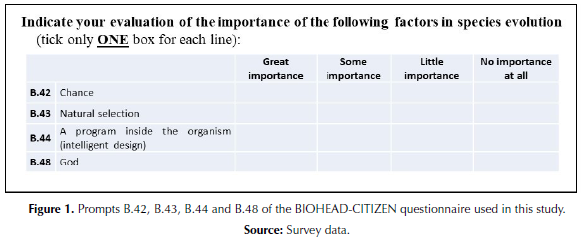

To characterise the students’ conceptions abouth the relationship between science and religion, the four categories of Barbour (1990) were used: conflict, independence, dialogue and integration. The responses to the prompts were analysed with respect to the religion (Table 2) of the respondents, with the hypothesis that the Catholic students’ conception of evolutionary theory would align to the scientific consensus with a higher frequency than Evangelical Christians, as was suggested by Madeira (2007).
Finally, to evaluate the significance of differences in student responses, data were subjected to Pearson’s chi-square (.2) statistical analysis, with significance assigned to p < 0.05.
2. Results and Discussion
Analyses of the students’ responses to each item are presented below.
a. Importance given to chance in the evolution of species (item B.42)
Global view
As shown in Figure 2, only a little more than half (56%) of the biology students assigned importance to chance in the evolution of species (composed of 23% giving ‘high importance’ + 33% giving ‘some importance’).
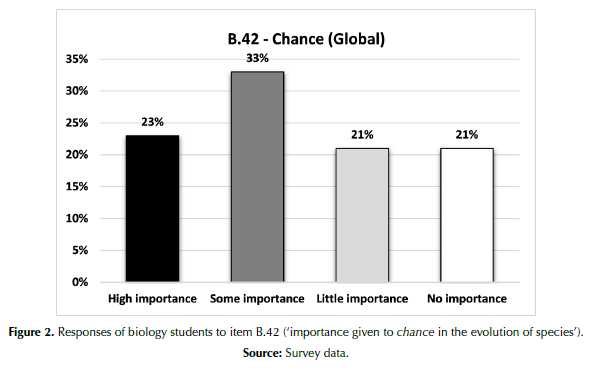
These results show an important contrast with general knowledge that is considered to be well established in the scientific community, where it is believed that most of the evolution molecular variation result of chance (Licatti, 2005; Futuyma, 2002) and that accidental natural phenomena, such as meteors, can contribute to evolution (Futuyma, 2002). Despite the relevance of chance to the evolutionary process, it is noticeable that some people have difficulty understanding that new and complex characteristics can result from evolutionary mechanisms (Carrol, 2006). Therefore, it is easy to disregard chance when biological evolution is conceived of as an intentional process aiming at the improvement and survival of living beings (Liporini, Periotto, 2014).
Furthermore, Sepulveda, El-Hani (2004 p. 170) argue that poor discussion of the concept of chance in biological instruction on evolution ‘contributes to the students’ consideration of the supposedly ‘random’ feature of the natural selection mechanisms as a counter-intuitive aspect to their understanding and assumption of the Darwinian Theory.’ A relevant epistemological obstacle to the understanding of evolutionary theory is that students take humans as ‘perfect beings’ and, consequently, the fruit of a Creator (Santos, Bizzo, 2000). It has been found that even within a religious environment and among believers in the Christian God, it is possible students and teachers can accept concepts that are contradictory to religious beliefs, such as the idea that chance is crucial for the evolutionary development of species (Sepúlveda, El-Hani, 2004).
2nd, 4th and 6th term groups
The results for this question ‘importance given to chance in the evolution of species’ obtained from the groups of students at the three moments (2nd, 4th and 6th terms) are presented in Figure 3. The .2 test indicated significant differences (p < 0.05) between the three groups on this question. Indeed, only 47% (26% + 21%) of the 2nd term students assigned importance to chance in the evolutionary process and more of the 4th and 6th term students considered it important, at 62% (12% + 50%) and 62% (29% + 33%), respectively. However, these values remain low overall, indicating that more attention should be given to evolution in teacher training for biology teachers at the University Center of Formiga. Similarly, work should be done at other Brazilian universities to determine how far instruction should be improved.
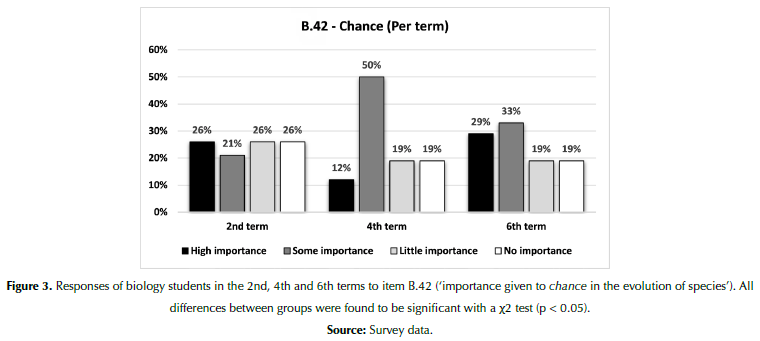
These results differ from those by Souza, Matsuo and Zaia (2009), who found no differences in students’ perception of evolution over the entirety of a biology teachers’ training course.
Religious groups
The analysis of data by religion (Catholic, Evangelical and Agnostic/Atheist), shows, as expected, that all Agnostic/Atheist biology students (100%, 60% + 40%) assign importance to chance in the evolution of species (Figure 4). The data further show that a much larger percentage of Catholics (60%, 20% + 40%) assigned importance to chance in evolution than Evangelicals (27%, 18% + 9%).
These results agree with those by Madeira (2007), who considers that Evangelical groups are often more resistant than Catholics to accepting scientific knowledge on issues related to biological evolution.
According to the categories outlined by Barbour (1990), the students’ conceptions in relation to the ‘importance given to chance in the evolution of species’ are to be understood as belonging to the independence category. In fact, most respondents who are religious could also acknowledge the importance of chance in evolutionary processes. These data contradict the results obtained by Carneiro, Rosa (2003), who claim that students have difficulty understanding the role of chance in biological evolution.
It should be noted that only a little more than half of the students (56%; Figure 2) agreed that chance is important in evolution. This indicates that the students should be categorised in the conflict category, as many do not accept the role of chance, which is one of the fundamental premises of evolutionary theory, possibly because of the tension that this factor produces in relation to the role of an omnipotent creator. Further, in-depth studies, including interviews with students, are required to understand more clearly the reasons why some religious students nevertheless do accept chance as an important factor in biological evolution.
b. Importance given to natural selection in the evolution of species (item B.43)
Global view
By contrast to the weak valuation that the participants gave to the role of chance in the biological evolution (56% - see Figure 1), great importance was assigned to natural selection (96%, 85% + 11%), as shown in Figure 5.
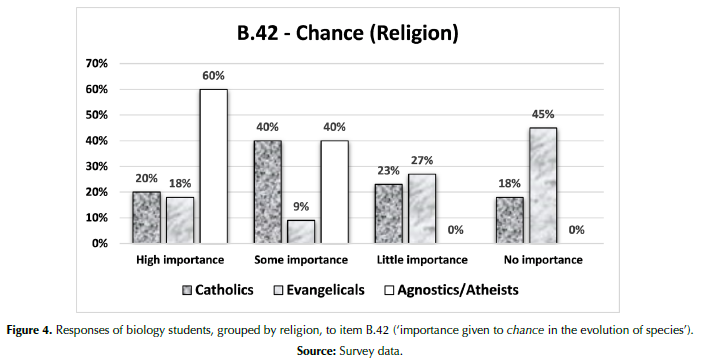
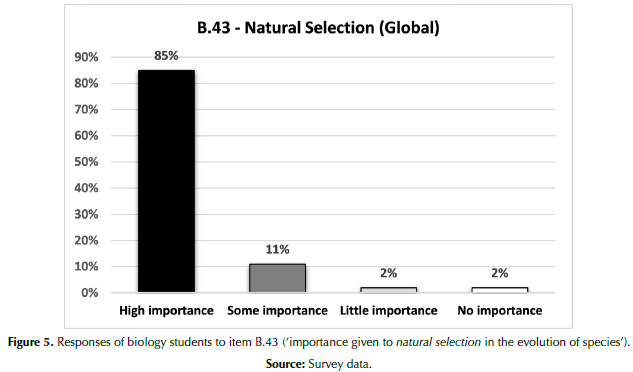
Although most students accepted the importance of the role of natural selection in the process of biological evolution, there was a small group of 4% (2% + 2%, Figure 5) who gave little or no importance to it. This matches the results of Bishop and Anderson (1990), who found that some students, even if a tiny number, have difficulty understanding the principles of this mechanism in the evolutionary process.
These results, however, differ from those of Almeida (2012) among secondary school students, where only 38% reported that natural selection is directly linked to the evolution of the species, indicating that more in-depth knowledge of biological evolution is necessary to allow for a proper understanding of the role of natural selection in evolution.
Natural selection is considered crucial to evolution by the scientific community (Pereira, 2009); Ridley (2004, p. 4) adds that ‘a beautifully simple and easily understood idea - evolution by natural selection - can be scientifically tested in all fields.’
2nd, 4th and 6th term groups
Analysis of the data at the three moments (2nd, 4th and 6th terms) showed statistically significant differences (p < 0.05) among the three groups. In Figure 6, it can also be seen that more importance to natural selection in evolution was given with the progression in the teacher-training course. Indeed, 100% of the 6th term (95% + 5%) and 100% of the 4th term (94% + 6%) students assigned importance to natural selection, but among the 2nd term only 89% (68% + 21%) assigned it important. These results (Figure 6), in contrast to chance (Figure 3), indicate that the training course improved knowledge, opening students’ minds to a more scientific vision of the role of natural selection in evolution. This is of great relevance, as some studies have found insufficiencies in how evolution is approached in teacher-training courses in Brazil (Valença, Falcão, 2012).
Religious groups
Similar to Figure 4 (about the importance of chance in biological evolution) the analysis by religion indicated that 100% of Agnostic/Atheist students assigned high importance to the role of natural selection in evolution. All Catholic students did so as well (90% + 10%) (Figure 7). By contrast, only 81% (63% + 18%) of Evangelicals assigned importance to natural selection. These results, once again, agree with those of Madeira (2007), who considered Catholicism to be more flexible in relation to evolution than Evangelicalism.
The fact that most students who declared themselves to be religious assigned importance to natural selection in the evolution suggests that on this question, the independence category of Barbour (1990) applies to this population.
c. Importance given to intelligent design in the evolution of species (item B.44)
Global view
Item B.44 (‘importance given to natural selection in the evolution of species’) investigates student conceptions of the importance of intelligent design in the evolution of species. The intelligent design hypothesis is a creationist view that does not consider that living beings could have developed by chance, natural selection and other natural phenomena, instead asserting that a being must be responsible for any evolutionary process (Sanches, 2007). Behe (1997), a strong proponent of the intelligent design hypothesis, claims that there must have been a designer that drove the evolution of species. This movement is considered by the international scientific community to be harmful to the acceptance of evolutionary theory (Shanks, 2004; Silva, 2017). It is strongly opposed, especially by US researchers, and teaching it in school has been prohibited by legal means in that country (Ayala, 2016).
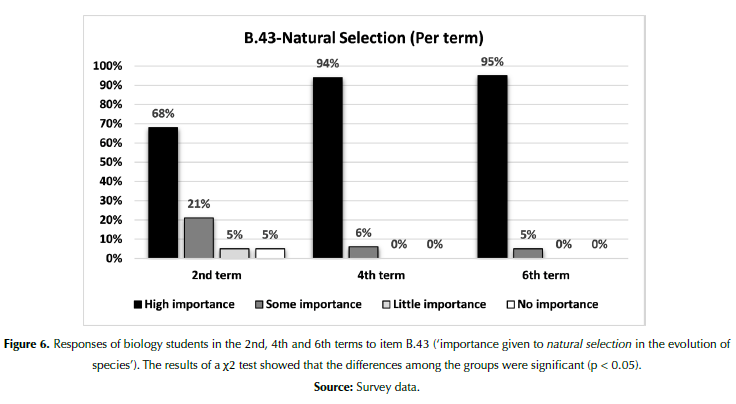
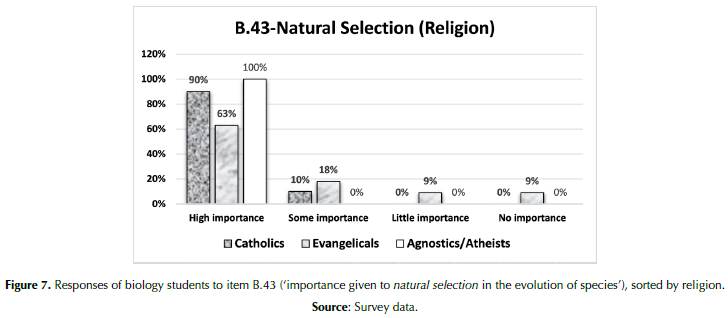
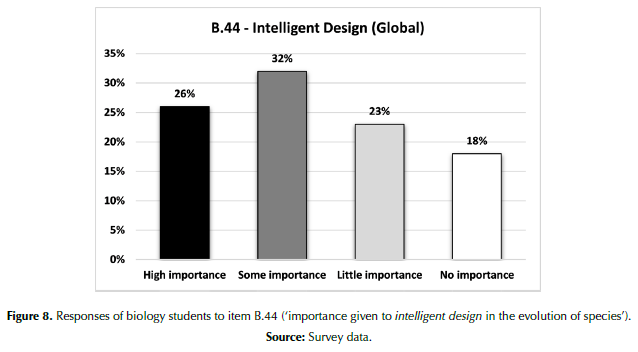
Figure 8 shows that more than half of biology students (58%, 26% + 32%) considered intelligent design to be important in evolution. Other studies have found a strong and increasing tendency to accept intelligent design among Brazilians (Silva, 2017; Silva, Mortimer, 2014).
Students’ responses indicate that they have difficulty separating their religious beliefs from their consideration of more controversial scientific topics. Intelligent design has been considered as a type of intermediary between science and theology (Dembski, 1999), with a claim to a kind of compromise with science: ‘the presentation and defence of the Intelligent Design argument as a strictly scientific theory is an assumed position from the 1990s on the basis of nineteenth-century arguments’ (Engler, 2011, p. 238). It has been suggested that students who accept intelligent design can follow this line of reasoning to approximate religiosity to scientific topics; the risk here lies in the possibility that these students deny the basic assumptions necessary to understand biological evolution, such as the role of random mutation (Ayala, 2017).
2nd, 4th and 6th term groups
The ![]() statistical analysis of the data obtained from the three groups of students (2nd, 4th and 6th terms) showed significant differences (p < 0.05) between them. In Figure 9, it is clear that the biology teachers’ training course contributed to the improvement of students’ knowledge. Indeed, a continuous decrease in the importance assigned to intelligent design was observed from the 2nd term (89%, 68% + 21%), to the 4th term (69%, 44% + 25%) and the 6th term (57%, 19% + 38%). Even so, a little less than half (43%, 19% + 24%) of the students in the 6th term persisted in asserting the importance of intelligent design in evolution.
statistical analysis of the data obtained from the three groups of students (2nd, 4th and 6th terms) showed significant differences (p < 0.05) between them. In Figure 9, it is clear that the biology teachers’ training course contributed to the improvement of students’ knowledge. Indeed, a continuous decrease in the importance assigned to intelligent design was observed from the 2nd term (89%, 68% + 21%), to the 4th term (69%, 44% + 25%) and the 6th term (57%, 19% + 38%). Even so, a little less than half (43%, 19% + 24%) of the students in the 6th term persisted in asserting the importance of intelligent design in evolution.
Previous studies have found indicate that longer and better-designed presentation of the scientific concepts of evolution may interfere with the influence of religiosity on the understanding of scientific topics (Silva et al. 2014) while also reducing the confusion between robust and evidence-based scientific theory and the intelligent design hypothesis (Pennock, 2003).
Nevertheless, a little less than half (43%, Figure 9) of the students in the 6th term persisted in considering the idea of intelligent design to be important for biological evolution. Similarly, in a study of students in a biology teacher-training course at a large Brazilian university, Souza, Matsuo, Zaia (2009) noticed that the simple presence of the subject of biological evolution in the led to no significant change in the decrease in the influence of religion in the construction of concepts related to the subject. He noted that this resistance to evolutionary theory might have harmful consequences for teaching practice, as these students, who are future teachers, may distort the instruction of biological evolution through presentations based on ideas of intelligent design (Souza, 2009). Further study is required to investigate this undesirable possibility.
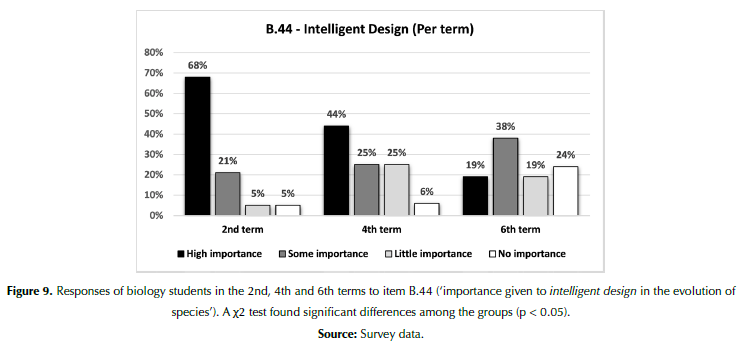
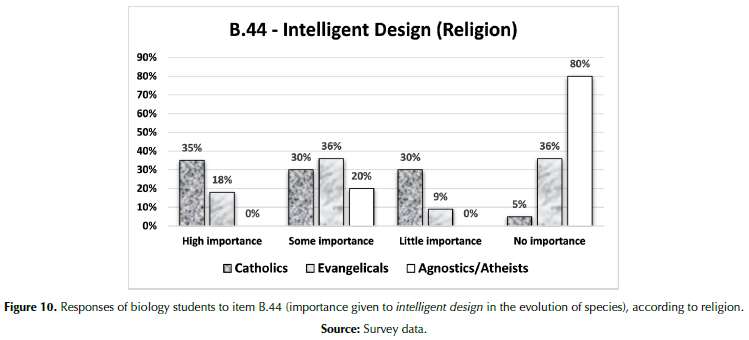
Religious groups
Data according to students’ religion showed that 0.0% of agnostic/atheist students assigned high importance to the role of intelligent design in evolution, but 20% of them did grant some importance to it (Figure 10). Catholics assigned more importance (65%, 35% + 30%) to intelligent design than Evangelicals (54%, 18% + 36%) did.
One interpretation of these results would be that religious students can accept scientific knowledge without abandoning their religiosity (Ávila, 2008). Padian, Matzke (2009) further argue that intelligent design is a theological concept that confuses people about the biological idea of evolution. This is, for example, what is described by Ayala (2007), who strongly criticises the religious approach of intelligent design in science and education (Silva, 2016).
Francisco José Ayala (2007), a theistic evolutionist, considers that belief in an intelligent designer is blasphemous because human beings and every other organism have many defects that are the fruits of evolutionary processes. According to Ayala (2007), Darwin’s discovery of evolution and natural selection is a gift for religion because it grants the ability to explain the evil that exists in the world without the need to attribute it to a creator.
Most religious students (Catholics and Evangelicals) granted intelligent design an essenctial place in the idea of evolution, expressing a mixture of concepts and elements participating in both religion and science. Because these students are seeking to accommodate scientific and religious knowledge to form their idea of the topic, they fall into the integration category, as delineated in Barbour (1990). It is, however, important to highlight that those who are religious but do not accept an important role for intelligent design in evolution fall into the Barbour category of independence.
Those in the independence category can teach evolutionary theory with no constraints. However, those that fall into the integration category, according to Amaral (2013), exhibit a teaching strategy to allow them to smuggle creationism into the academic environment in disguise, under the term intelligent design. It is crucial to explore how such future teachers intend to work in the classroom and learn whether they consider intelligent design, which is not a hypothesis that has been confirmed scientifically, should be used in the instruction of evolution.
d. Importance given to GOD in the evolution of species (item B.48)
Global view
The students’ responses to the fourth and last question analysed in this study (B.48) are shown in Figure 11. A large majority of biology students (86%, 63% + 23%) assigned importance to God in evolution.
These results indicate that the surveyed students were heavily influenced by their religious beliefs. In a previous study of students studying in a similar course, also in Brazil, Sepúlveda and El-Hani (2004) perceived two aspects in particular that influence coexistence between science and religion: one that deliberately denies this knowledge and another that unites the vision of a theistic world to scientific themes in an integrated way. In another study with students on a psychology course, Guerriero (2000) found that students who profess a religion study and discuss the theme of biological evolution in a way that tries to accommodate the divine into their speech, finding to greater or less influence of a Creator in biological evolution.
2nd, 4th and 6th term groups
A ![]() test found statistically significant differences (p < 0.05) between the three-term groups, indicating that the course helped students understand biological evolution. In fact, a continuous decrease of the importance given to God was observed from the 2nd term (100%, 79% + 21%) to the 4th term (88%, 69% + 19%) and the 6th term (72%, 43% + 29%) (Figure 12).
test found statistically significant differences (p < 0.05) between the three-term groups, indicating that the course helped students understand biological evolution. In fact, a continuous decrease of the importance given to God was observed from the 2nd term (100%, 79% + 21%) to the 4th term (88%, 69% + 19%) and the 6th term (72%, 43% + 29%) (Figure 12).
These results indicate that as knowledge is consolidated regarding biological evolution, students develop a closer understanding of biological evolution and, consequently, can avoid possible religious and common-sense interference. It is important to emphasise that the percentage of those attributing importance to the role of God in evolution remains high, even in the 6th term (72%).
Religious groups
In a similar way to the responses to the intelligent design question (Figure 10), no agnostic/atheist students assigned high importance to the role of God in evolution, but 20% did give it some importance (Figure 13). By contrast, all Evangelicals (100%,90% + 10%) and a very high percentage of Catholics (90.0%, 63% + 27%) assigned importance to the role of God in biological evolution.
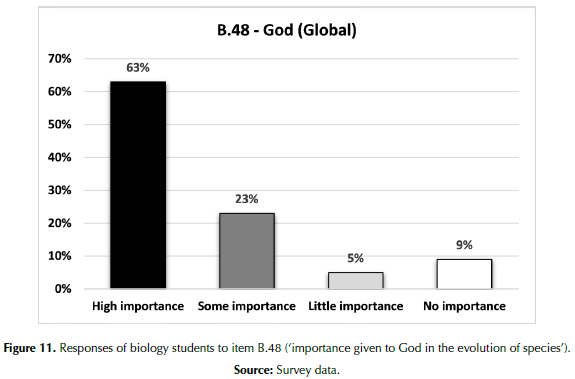
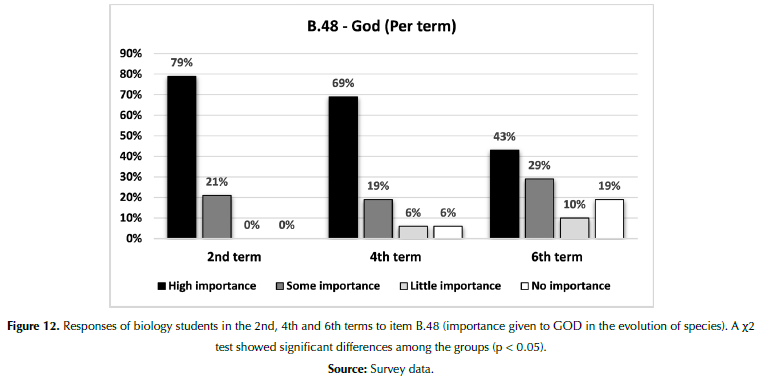
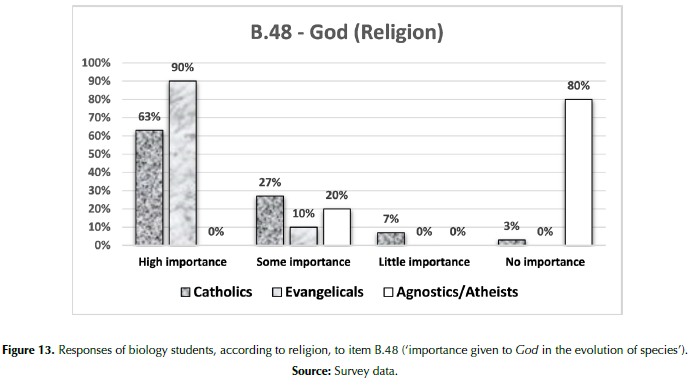
The results showed that all Evangelical and most Catholic students accepted the influence of a divine figure in evolution, indicating that they were able to integrate a mixture of concepts and elements participating in both religion and science. Therefore, these students would be categorised under integration category of Barbour (1990). However, it must be recognised that those Catholics who did express acceptance of the importance of God’s role in evolution fall into the independence category.
3. Final Remarks and Conclusions
As expected, these results, taken together, showed, that the agnostic/atheist students assigned great importance to the role of chance (B.42) and natural selection (B.43) in evolution and did not grant significance to intelligent design (Question B.44) or God (Question B.48) in it. By contrast, Evangelicals and Catholics believe more strongly in the importance of intelligent design and God in evolution than in the importance of chance or natural selection.
Because most Catholics and Evangelicals reported believing in a mixture of concepts and elements from both religion and science, they fall into the category of integration in the schema developed by Barbour (1990). The religious students that do not accept the importance of intelligent design in evolution are assigned the Barbour category of independence.
This study analysed biology students that will become teachers in a short time. It is known that the religion of the teacher may interfere in the presentation of certain concepts in evolutionary theory, such as adaptation, common ancestry, chance and natural selection (Alexakos, Pierwola, 2013; Costa, Melo, Teixeira, 2011; Porto, Falcão, 2010). This is particularly relevant for those in the integration category, as they may teach the evolution process in a way that incorporates intelligent design. By contrast, the religious future teachers who were in the independence category should be able to easily teach evolutionary theory because they can separate religion from science.
No direct association has been established between the conceptions of a teacher to be about evolution and their teaching methods. Nevertheless, it is generally recognised that teachers experience challenges in approaching this topic in school (Oleques, Bartholomei-Santos, Boer, 2011; Valença, Falcão, 2012); thus, evolution, which is an integrative topic, must be reinforced and approached in a comprehensive manner in teacher-training courses for future biology instructors (Bizotto, Ghilardi-Lopes, Santos, 2016). Because the role of the teacher goes beyond teaching specific scientific contents, teachers can use the topic of evolution to make students aware of the different social views and learn how to respect them, even if they do not agree with them.
This study of the students in the biology teachertraining course at the University Centre of Formiga, Minas Gerais, Brazil, indicated that it is essential to expand students’ knowledge, opening their minds to a more scientific vision of the role of chance (B.42) and natural selection (B.43) in the biological evolution process. This is relevant to the future role that these students will play as teachers of biological evolution, which is required in the National Curricular Parameters of Brazil. As teachers, they can influence their students’ construction of concepts related to evolution.
Due to the importance of biological evolution in the scientific context, it is crucial to carry out research in Brazil that supports the understanding of the perceptions of future teachers and in-service teachers, with the goal of improving the instruction of evolution and the avoidance of possible failures of the approach to evolution presented to students and, most importantly, to prevent any attempt to insert religious themes into science classes, including creationism and intelligent design.
References
ABREU, H. O Ensino da Evolução no Presente Uma Análise Crítica. Colquio do Centro de Filosofia das Ciências da Universidade de Lisboa. Faculdade de Ciências da Universidade de Lisboa. Lisboa. 2007. Disponível em <http://cfcul.fc.ul.pt/coloquios/coloquio_criacionismo/coloquio_criacionismo.htm>. Acess: June 20, 2019
ALEXAKOS, K.; PIERWOLA, A. Learning at the ‘‘boundaries’’: radical listening, creationism, and learning from the ‘‘other’’. Cult. Stud. of Sci. Educ., Heidelberg, v. 8, pp. 39–49. 2013. https://doi.org/10.1007/s11422-012-9470-7
ALMEIDA, D. F. de. Concepções de alunos do ensino médio sobre a origem das espécies. Ciência & Educação, Bauru, v. 18, n. 1, pp. 143-154. 2012. https://doi.org/10.1590/S1516-73132012000100009
AMARAL, J. A. Fatores que dificultam ou facilitam o ensino-aprendizagem de Evolução Biológica na visão de professores de Biologia em Mossoró/RN. In: IX CONGRESSO DE INICIAÇÃO CIENTÍFICA DO IFRN. Anais do… Rio Grande do Norte. pp. 1826 2013.
ÁVILA, G. C. The edge of evolution: the search for the limits of darwinism. Revista Brasileira de Histia, São Paulo, v. 28, n. 56, pp. 593-596. 2008. https://doi.org/10.1590/S0102-01882008000200019
AYALA, F. J. Darwin's gift to science and religion. National Academies Press. Washington D. C., United States. 2007.
AYALA, F. J. Scientific literacy and the teaching of evolution. Ludus Vitalis, Mexico D. F., v. 21, n. 39, pp. 231-237. 2016.
AYALA, F. J. A Origem da Humanidade e o seu futuro biolico. Printer Portuguesa. Rio de Mouro: Portugal. 2017.
BARBOUR, I. G. Religion in an Age of Science. Harper San Francisco. San Francisco: United States. 1990.
BARBOUR, I. G. Quando a ciência encontra a religião. Editora Cultrix. São Paulo: Brasil. 2004.
BEHE, M. J. A caixa preta de Darwin: o desafio da bioquímica à teoria da evolução. Jorge Zahar. Rio de Janeiro: Brasil. 1997.
BISHOP, B. A.; ANDERSON, C. W. (1990). Student Conceptions of Natural Selection and Its Role in Evolution. Journal of Research in Science Teaching, Champaign, n. 27, pp. 415-427. https:// doi.org/10.1002/tea.3660270503 BIZOTTO, F. M; GHILARDI-LOPES, N. P.; SANTO, M. N. A vida desconhecida das plantas: concepções de alunos do ensino superior sobre evolução e diversidade das plantas. Revista Electrica de Ensenza de las Ciências, Porto, v. 15, n. 3, pp. 394-411. 2016.
CARNEIRO, A. P. N.; ROSA, V. L. Três aspectos da evolução: concepções sobre Evolução Biológica em textos produzidos por professores a partir de um artigo de Stephen Jay Gould. In: ENCONTRO NACIONAL DE PESQUISA EM EDUCAÇÃO EM CIÊNCIAS. Atas…, USP. São Paulo: Brasil. 2003.
CARROL, S. B. Infinitas formas de grande beleza: como a evolução forjou a grande quantidade de criaturas que habitam o nosso planeta. Tradução de D. ALFARO. Jorge Zahar Ed. Rio de Janeiro: Brasil. 2006.
CARVALHO, G. S.; CLÉMENT, P. Projecto ‘Educação em Biologia, Educação para a Saúde e Educação Ambiental para uma melhor cidadania’: análise de manuais escolares e concepções de profes-sores de 19 países (europeus, africanos e do próximo oriente). Revista Brasileira de Pesquisa em Educação em Ciências, Belo Horizonte, v. 7, n. 2, pp. 1-21. 2007.
COIMBRA, R. L.; SILVA, J. Ensino de evolução biológica e a necessidade de formação continuada. In: ENCONTRO NACIONAL DE PESQUISA EM EDUCAÇÃO EM CIÊNCIAS. pp. 1-12 Florianópolis. Anais… ABRAPEC. Florianópolis, Brasil. 2007.
COSTA, H. A.; ANTUNES, F. Criacionismo e evolução: conflito cognitivo ou superação em biólogos com formação religiosa protestante? In: ENCONTRO DE ENSINO, PESQUISA E EXTENSÃO. pp. 1-20 Mato Grosso do Sul. Anais… ENEPEX. Mato Grosso do Sul. 2014.
COSTA, L. O.; MELO, P. L. C.; TEXEIRA, F. M. Reflexões acerca das diferentes visões de alunos no ensino médio sobre a origem da diversidade biológica. Revista Ciência e Educação, Bauru, v. 17, n. 1, pp. 115-128, 2011. https:// doi.org/10.1590/S1516-73132011000100008
DAWKINS, R. O Relojoeiro Cego: A Teoria da Evolução, o Desígnio Divino. Companhia das Letras. São Paulo: Brasil. 2001.
DAWKINS, R. Deus, um delírio. Companhia das Letras. São Paulo: Brasil. 2007.
DEMBSKI, W. A. Intelligent Design: the bridge between science & theology. Downers Grove: IVP Academic. Illinois: United States. 1999. Disponível em: <https://books.google.com.br/books?id=Sd8I7U3ryKAC&printsec=frontcover&hl=pt-BR&source=gbs_ge_mary_r&cad=0#v=onepage&q&f=false>. Acesso: 13 de agosto de 2015.
DOBZHANSKY, T. Genetic diversity and human equality. Basic Books. New York: United States. 1973.
ENGLER, S. Tipos de Criacionismos Cristãos. Revista de Estudos da Religião, São Paulo, v. 2, n. 7, pp. 83-107. 2007.
FUTUYMA, D. J. Evolução, ciência e sociedade. Sociedade Brasileira de Genética. São Paulo: Brasil, 2002.
GUERRIERO, S. A fé na ciência: o ensino da evolução e sua congruência aos sistemas de crenças. In: XXII Reunião Brasileira de Antropologia. Fórum de Pesquisa Venturas e Aventuras Religiosas. Brasília, DF, v. 15, 15-19 de julho, 2000.
GOULD, S. J. Pilares do Tempo. Ciência e religião na plenitude da vida. Rocco. Rio de Janeiro: Brasil. 2002.
LICATTI, F. (2005). O Ensino de Evolução Biológica no Ensino Médio: investigando concepções dos professores de Biologia. Bauru: UNESP. 240 f. Dissertação Mestrado em Educação para Ciência, Faculdade de Ciências, Universidade Esta-dual Paulista–UNESP. São Paulo. 2005.
LIPORINI, T. Q.; PERIOTTO, F. A Evolução Biológica na Ótica de Alunos do Ensino Médio. In: V Jornada das Licenciaturas da USP/IX Semana da Licenciatura em Ciências Exatas–SeLic. São Carlos. 2014.
MADEIRA, A. Fé e evolução: a influência de crenças religiosas sobre a criação do homem na aprendizagem da teoria da evolução com alunos do 3º ano do ensino médio. 186p. Doutorado em Educação en PUC/SP. 2007.
MEYER, D.; EL-HANI, C. N. Evolução: o sentido da biologia. Unesp. São Paulo: Brasil. 2005. https:// doi.org/10.7476/9788539302758
NORD, W. A. Science, religion and education. Religion & Education, Carolina do Norte, v. 26, n. 2, pp. 55-66. 1999. https://doi.org/10.1080/15507394.1999.11000904
OLEQUES, L. C.; BARTHOLOMEI-SANTOS, M. L.; BOER, N. Evolução biológica: percepção dos profesores de biología. Revista Electrica de Ensenza de las Ciências, Porto, v. 10, n. 2, pp. 243-263. 2011.
PADIAN, K; MATZKE, N. Darwin, Dover, ‘Intelligent Design‘ and textbooks. Biochemical Journal, London v. 209, n. 417, pp. 29-42. 2009. https:// doi.org/10.1042/bj20081534
PACHECO, R. B. C.; OLIVEIRA, D. L. O homem evoluiu do macaco? Equívocos e distorções nos livros didáticos de Biologia. In: VI ENCONTRO DE PERSPECTIVAS DO ENSINO DE BIOLOGIA. 87p. São Paulo. Anais… FEUSP. São Paulo: Brasil. 1997.
PENNOCK, R. T. Creationism and intelligent design. Annual Review of Genomics and Human Genetics, Salt Lake City, v. 4, n. 1, pp. 143163. 2003. https://doi.org/10.1146/annurev.genom.4.070802.110400
PEREIRA, H. M. R. Um olhar sobre a dinâmica discursiva em sala de aula de biologia do ensino médio no contexto do ensino da evolução biológica. 167f. Dissertação (Mestrado)–Pós-Graduação em Ensino, Filosofia e História das Ciências, Universidade Federal da Bahia/Universidade Estadual de Feira de Santana, Salvador. 2009.
PIOLLI, A.; DIAS, S. Escolas não dão destaque à Evolução biolica. 2004. Disponível em: <http://www.comciencia.br/200407/reportagens/05.shtml>. Acesso em 19/09/2016.
PORTO, P. R. DEA.; FALCÃO, E. B. M. Teorias da origem e evolução da vida: dilemas e desafios no ensino médio. Ensaio Pesquisa em Educação em Ciências, Belo Horizonte, v. 12, n. 3, pp. 13-30. 2010. https://doi.org/10.1590/1983-21172010120302
RIDLEY, M. Evolution. Blackwell. Malden, Massachusetts: United States. 2004.
RODRIGUES, L. A.; CHAVES, S. N. Entre Dogmas: Criação e Evolução Fabricando Docência em Biologia. In: ATAS DO IX ENCONTRO NACIONAL DE PESQUISA EM EDUCAÇÃO EM CIÊNCIAS–IX ENPEC. pp. 1-8 Águas de Lindóia, SP. 2013
RODRIGUES, W. G.; CLEMENTINO, P. P. O ensino da teoria evolucionista na perspectiva dos professores de ciências da rede adventista de ensino. Revista Formadores, Cachoeira, v. 7, n. 3, pp. 5-27, 2014.
RODRIGUES, W. G.; MOTTA, R. S. S. Relações entre ciência e religião na perspectiva dos professores da Faculdade Adventista de Fisioterapia (FAFIS). Práxis Teolica, Cachoeira, v. 11, n. 1, pp. 105-129 2011
SANCHES, M. A.; DANILAS, S. Busca de harmonia entre religião e ciência no Brasil: Reflexões a partir do ano de Darwin. Teocomunicação, Porto Alegre, v. 42, n. 1, pp. 98-118 2012.
SANCHES, M. A. O diálogo entre teologia e ciências naturais. O Mundo da Sae, São Paulo, v. 31, n. 2, pp. 179-186 2007. https://doi.org/10.15343/0104-7809.200731.2.5
SANTOS, S.; BIZZO, N. O ensino e a aprendizagem de Evolução Biológica no cotidiano da sala de aula. In: VII ENCONTRO PERSPECTIVAS DO ENSINO DE BIOLOGIA. Anais do VII Enc. Perspectivas do Ensino de biologia. Faculdade de Educação da Universidade de São Paulo. São Paulo: Brasil. 2000.
SEPULVEDA, C.; EL-HANI, C.N. Quando visões de mundo se encontram: religião e ciência na trajetória de formação de alunos protestantes de uma licenciatura em Ciências Biológicas. Investigaçs em Ensino de Ciências, Porto Alegre, v. 9, n. 2, pp. 137-175. 2004. https://doi.org/10.1093/0195161998.003.0003
SHANKS, N. God, the devil, and Darwin: A critique of intelligent design theory. Oxford University Press. Oxônia: Reino Unido. 2004.
SILVA, H. M. Interview with Francisco J. Ayala. Conexão Ciência (Online), Formiga, v. 11, n. 1, pp. 5-8. 2016.
SILVA, H. M. Intelligent design endangers education. Science, New York, v. 357, n. 6354, pp. 880-880. 2017. https://doi.org/10.1126/science.aao3245
SILVA, H. M.; ARAÚJO, E. S. N. N. DE.; GIBRAM, D. E.; CARVALHO, G. S. Conceptual change about evolution and origins of life throughout an undergraduate course of Biological Sciences. In: Proceedings of INTCESS 14-International Conference on Education and Social Science Proceedings. pp. 1249-1258. Istanbul: Turkey. 2014.
SILVA, H. M.; MORTIMER, E. ‘Rescuing Darwin’ in Brazil 1. In: SILVA, I. (Ed.). Latin American Perspectives on Science and Religion. Pickering & Chatto. Oxford. The United Kingdom. 2014. pp. 97-108. https://doi.org/10.4324/9781315653990-9
SOUZA, S. de. A goleada de Darwin- sobre o debate criacionista/darwinismo. Editora Record. Rio de Janeiro: Brazil. 2009.
SOUZA, R. F.; MATSUO, T.; ZAIA, D. A. M. Evolucionismo X Criacionismo. Revista Ciência Hoje, v. 43, n. 256, pp. 36-45, janeiro/fevereiro. 2009.
STAUB, T.; STRIEDER, D. M.; MEGLHIORATTI, F. A. Análise da Controvérsia entre Evolução Biológica e Crenças Pessoais em Docentes de um Curso de Ciências Biológicas. Revista Electrica de Investigaci en Educaci en Ciencias, Buenos Aires v. 10, n. 2, pp. 20-36 2015.
VALENÇA, C. R.; FALCÃO, E. B. M. Teoria da evolução: Representação de professores-pesquisadores de biologia e suas relações com o Ensino Médio. Revista Electrnica de Enseanza de las Ciências, Porto, v. 11, n. 2, pp. 471-486. 2012.
License
Gondola, Ens Aprend Cienc. is an open-access publication, free of charge for authors and readers. The publication, consultation or download of the contents of the magazine does not generate any cost for the authors or the readers, since the Francisco José de Caldas District University assumes the expenses related to edition, management and publication. The peer evaluators do not receive any economic retribution for their valuable contribution. The work of all the actors mentioned above is understood as a contribution to the strengthening and growth of the research community in the field of Science Education.
As of December 1, 2018 the contents of the journal are published under the terms of the Creative Commons License Attribution-Noncommercial- ShareAlike 4.0 International (CC-BY-NC-SA 4.0), under which others may distribute, remix, retouch, and create from the work in a non-commercial way, give credit and license their new creations under the same conditions.
The copyright holders are the authors and the journal Gondola, Ens Aprend Cienc. The holders retain all rights without restrictions, respecting the terms of the license in terms of consultation, downloading and distribution of the material.
When the work or any of its elements is in the public domain according to the applicable law in force, this situation will not be affected by the license.
Likewise, we encourage authors to deposit their contributions in other institutional and thematic repositories, with the certainty that culture and knowledge is a good of all and for all.

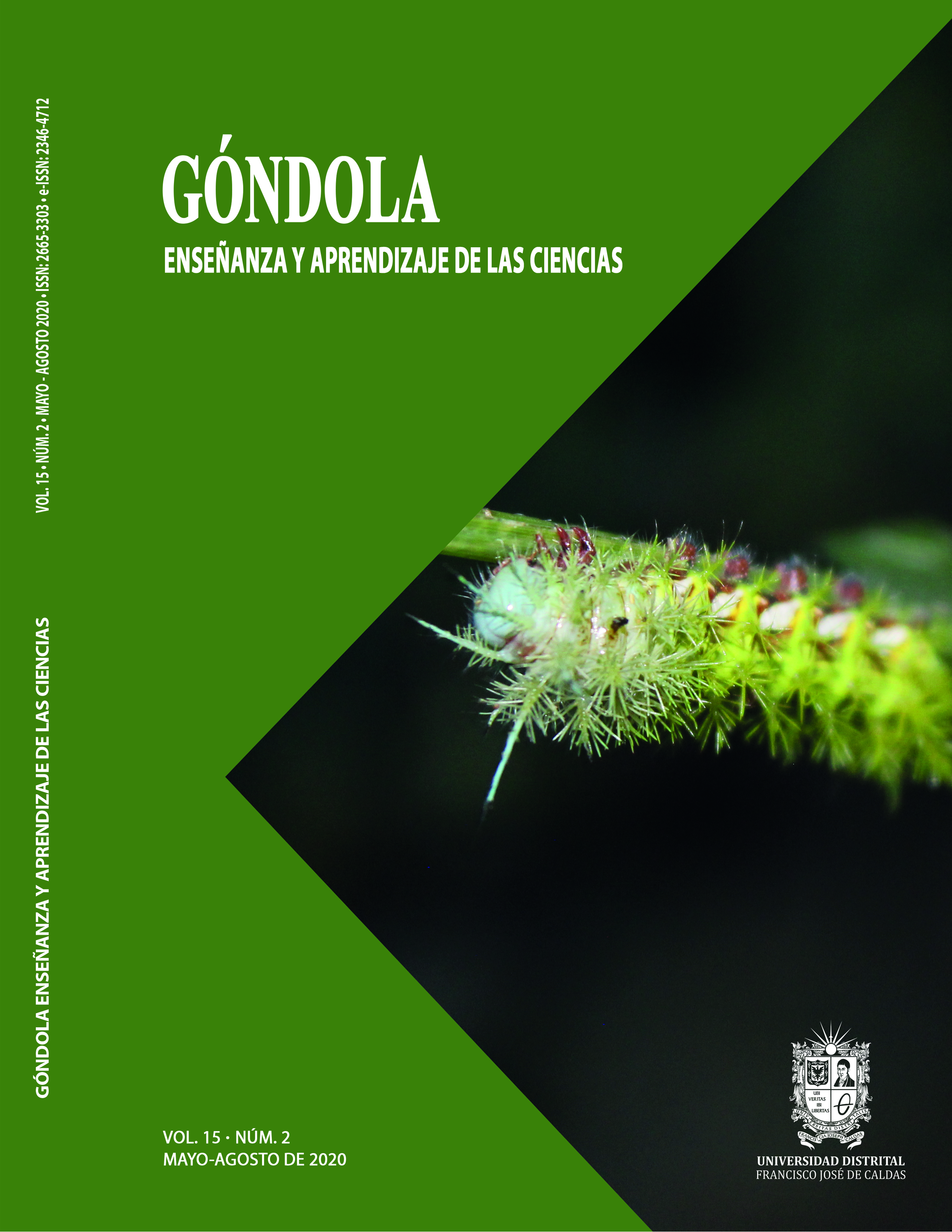


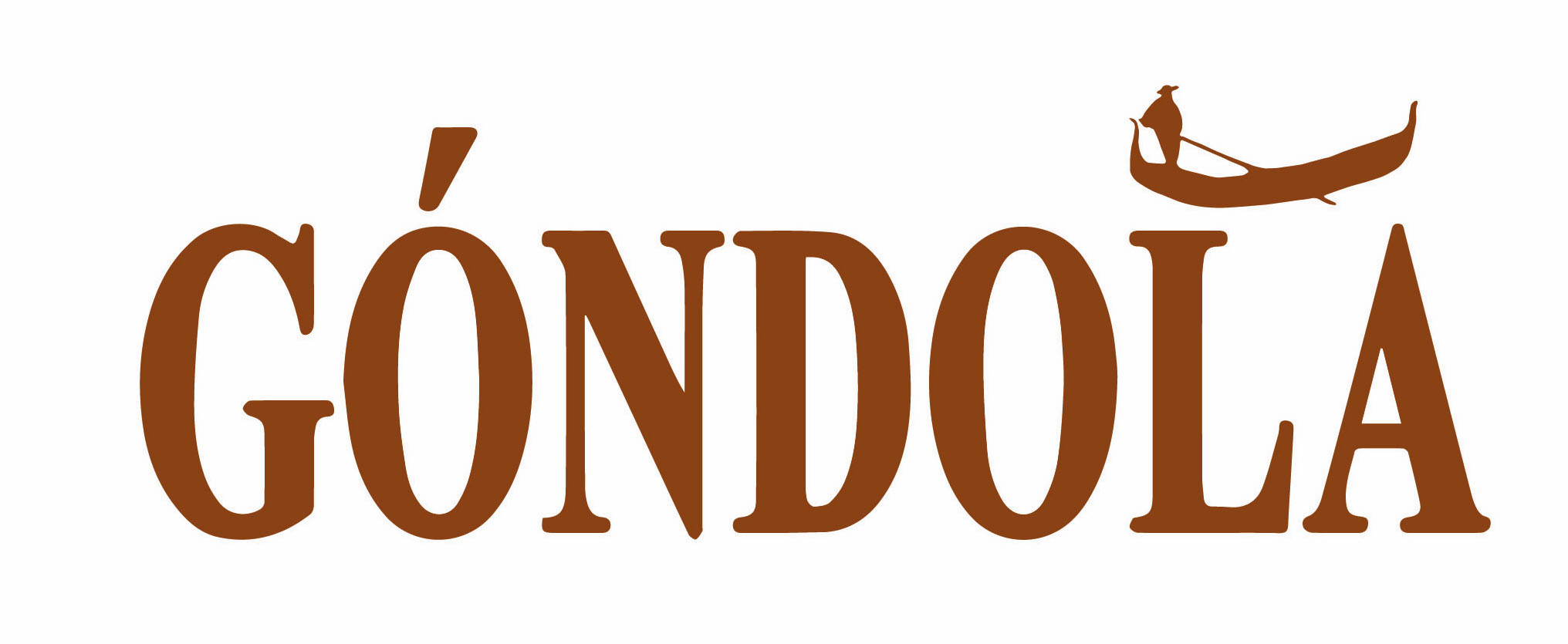
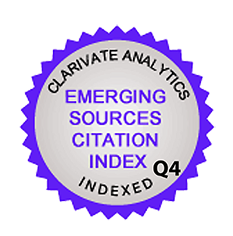



.jpg)
